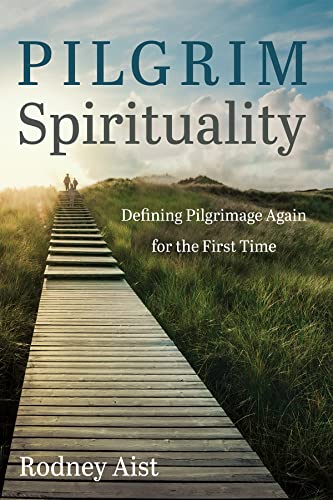Pilgrim Spirituality: Defining Pilgrimage Again for the First Time
Rodney Aist
Cascade Books, 2022
<Buying via this Amazon Link will donate 5% of the price to JMECA>
Review by: Andrew D. Mayes

Pilgrimage is a complex phenomenon and in this book Rodney Aist, course director at St George’s College, Jerusalem, offers a way of identifying its constituent parts and formative factors, a roadmap with which to navigate its complexity. This is a substantial compendium, drawing together in a kind of magnus opus all the insights Aist has gained through his diverse experience of pilgrimage.
It is a thorough and comprehensive attempt to help the reader formulate a nuanced definition of pilgrimage – hence, its subtitle: ‘Defining pilgrimage again for the first time’. It is a kind of primer, in two senses: a textbook delineating the essential elements of pilgrimage and a resource with potential to kindle into life a heuristic process of reflection on the experience, stoking the fires of interpretation and recollection. Its style is didactive and instructive, yet ever beckoning the reader to make his or her own discoveries. At times the analytical focus almost becomes forensic in its attention to all the details that comprise the pilgrimage experience, but the book saves itself from being prescriptive in inviting the reader to an alertness and wideness of vision: it moves from the particular to the universal, presenting pilgrim spirituality as embracing all aspects of Christian life. Perhaps the book could be made a little more user-friendly, with questions at the end of chapters or in an appendix/ handout so that they are easily accessible to the pilgrim: extremely significant questions are raised that need to be “on hand”, especially in the course of a pilgrimage.
This is a resource for students and researchers exploring the theme of pilgrimage, for those who design and lead pilgrimages, but pilgrims of every kind will benefit: those preparing for a pilgrimage, those wanting to reflect after the experience, and those who, not travelling physically want to make sense of their life through this powerful lens and metaphor. It summons readers to examine their motives, expectations and hopes. It broadens and expands both the concept and practice of pilgrimage, and I especially liked the way it emphasizes, in contrast to individualistic approaches, the corporate nature of pilgrimage and the call to attentiveness towards the Other and the street – it is not just the holy place that matters, but its context in every sense. Indeed, this is one of the blessings St George’s courses offers – pilgrims might arrive with a devotional focus in mind but soon discover that pilgrimage is an immersive experience, requiring courageous and prayerful engagement with the whole setting, ruling nothing out in its transformative impact. Like discipleship itself, it’s about change: the meaning of metanoia is, literally, ‘going into the big mind’ or ‘going beyond one’s existing mindset’ – learning to see God, self and the world differently.
When I was St George’s course director, I often made the contrast between tourist and pilgrim. St George’s doesn’t do ‘tours’ – the word comes from ‘tower’ and suggests viewing things from a safe distance: we are pilgrims – the word comes from the Latin per ager, through the fields. That implies a dusty, demanding journey, venturesome, risky, involving vulnerability and uncensored openness to discovery. Rodney Aist’s book declares that the Christian life itself is that kind of journey.
Featured in Bible Lands, Winter 2022

